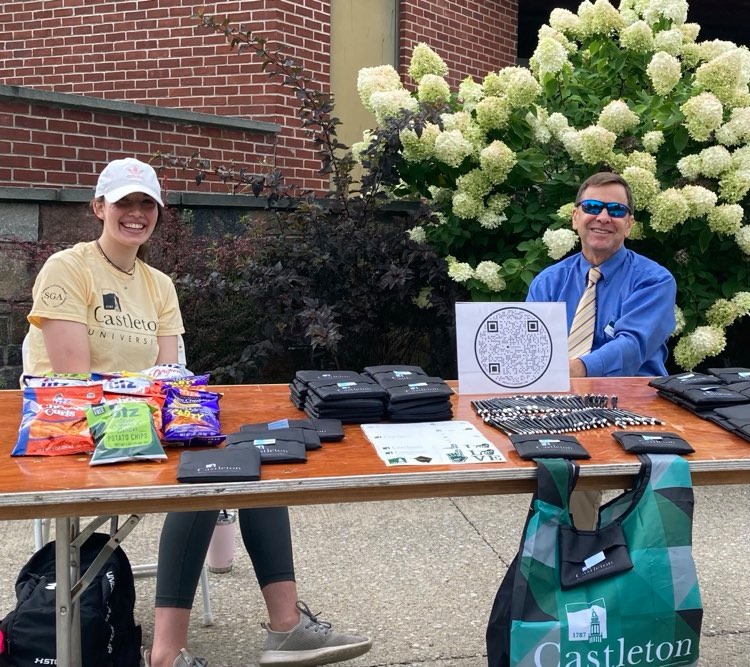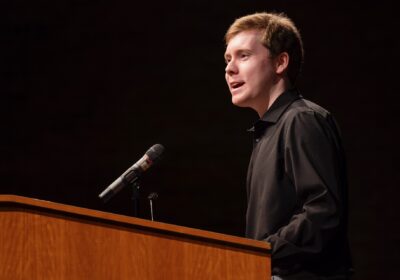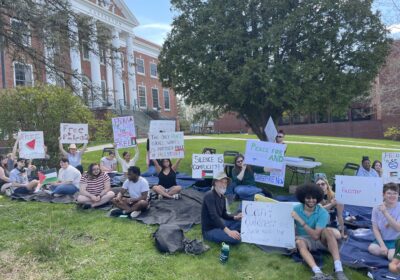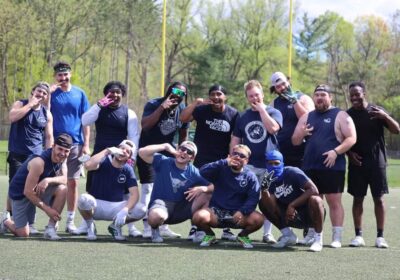Answering the burning questions with Burnham Holmes

Burnham Holmes is a part-time English professor who has taught at Castleton University for 19 years. He has worked in publishing, been a freelance writer, and taught writing and literature for 15 years at the School of Visual Arts in New York City.
Q. Favorite Netflix show?
A. “The one I’ve been spending time with lately is “Orange is the New Black,” although that’s infuriating because I wish these people would worry more about living the good life a little more than they do. I also really enjoyed Amanda Taylor Joy in “The Queen’s Gambit.” I like shows about Miles Davis or Nina Simone. I watched Fran Lebowitz because I knew her when she was a writer in New York, and now she’s a personality. She did a TV series with Martin Scorsese recently.”
Q. On that subject, what was it like being in New York during that writing period and being around these authors? I recall you were Toni Morrisson’s assistant.
A. “It was challenging. First day I went in for an interview and she almost didn’t hire me because I’d been in the Army and she thought I was gonna be a wack-a-doodle. Then she realized I wasn’t and wore red socks on occasion. And my hair was always a bit long.
I remember the first day she asked me if I heard of the Chicago Manual of Style. I said I heard of it. She reached back behind her and grabbed a copy, an orange cover, and she threw it at me and I caught it against my chest. She said take this home and study it. This is your bible now. I remember the first weekend I woke up with the book on my chest and the lamp beating down on my eyes. I spent a lot of time studying that so I could handle her questions of style and punctuation … We went for a drink every night after work and I got to know her pretty well. I admired her because she was so talented. One weekend we had a school dictionary coming out and we had someone writing the forward and he couldn’t really write it. So, she and I went in on a weekend and wrote a 70 manuscript-page introduction. I worked on examples and I was impressed with how proficient and knowledgeable she was.
During her down time there, she was working on her first novel, The Bluest Eye and I got to photocopy it. She would write on yellow legal pads with a purple pen and then she would transfer that to an IBM Selectric – because we didn’t have computers back then and that was a writer’s dream. Then I would make photocopies and I was, like, the first reader of The Bluest Eye, which I guess is my claim to fame! She would yell down the hall, ‘through with that yet?’ and I’d say, ‘not yet.’ Because I’d be reading as fast as I could.
I enjoyed being involved in that way. She wasn’t widely known then. John Leonard, a writer for the New York Times, gave The Bluest Eye a rave review and really helped champion the work.
Working for Toni, I knew she was a star. Everyone else knew it too. We just didn’t know how big a star she was. Sometimes you are around someone and you know they are really good, but you don’t know that they are going to win the Nobel Prize in literature in 1993. Her star rose about as high as it could go, and she is one of the most prominent writers of the 20th century and I am proud to have worked for her. It is certainly something I will never forget and I recall it fondly. I knew her when she was an aspiring writer from Ohio with two sons, and how she would get up early and write while she would get her kids ready for school.
I cherish that memory. She had good work habits and she was a serious person.”
Q. Now speaking of creative work, I know you’ve done some work yourself. What’s the story behind Trumpleton as well as your poetry?
A. “Trumpleton is something Karen Clomey and I have written. It’s a musical parody of Donald Trump. We wrote it for a cast of four. We have 32 songs and we have taken standards from musical theater – I like Steven Sondheim, so a few of his songs. One that I like is from “The Fantasticks,” repurposed to “The Wall Song.” We’ve had six performances of it, three in Poultney and three in Rutland. We were going to go off Broadway in April of 2020. It was all set up then COVID hit. Broadway was shut down. We have plans for April 2022. We’ll be two blocks from Hamilton. We also had to rewrite the show because of the insurrection.”
Q. So you had to update it?
A. “Big time. We had to add a whole second act. Eliminate some songs, and we’ve done that as well as reshuffling the cast because it’s hard to hold onto a cast for several years. We had to search for a few new actors, and we are still in the process of recasting it.
Poetry is something that’s ongoing. I’ve written poetry most of my life. I have a love for Shakespearean sonnets. I’ve written 150 of those and am looking to make those into a collection
I also love Jazz Poetry. I have three that I’m doing at the Stone Valley Arts in Poultney.”
Q. Do you have any advice as a writer that you would give to a new writer?
A. “First, there are two parts in writing. One is making a mess and the other is cleaning it up. The mistake many of us make is that we try for perfection while we create.
I grew up playing in a sandbox. In fact, I think people were worried there was something wrong with me, but I enjoyed that sandbox. I was six or seven, something. I enjoyed making the mess and just playing. I still have that with writing, sitting down and not always knowing what I am doing. I enjoy writing with a pencil or pen on paper. I like having music on, or live music if I can get it, and write while it is happening. Or writing in public places.
If I had to give one piece of advice to writers and new, aspiring writers, it is to not be afraid to make mistakes. With everything you make mistakes and there is a long learning process. We get too critical too early. School writing has hurt a lot of us, as we are writing for a grade.
Look at writing as a lifelong pursuit. You can write long after a lot of things you can’t do.
So, don’t focus on where the commas are. Just get the story down. Get the language down first then worry about what sounds the best.”
Q. So free write initially and reign it in later?
A. “Yes, I’d say free writing. Enjoy the process of writing. To enjoy sports is to enjoy your body in motion. If you don’t like exercise, it’s a tough thing to be an athlete. It works better if you enjoy writing.”
Q. What drew you to teaching?
A. “I was working in publishing and I was sitting at my desk, at a cubicle, for years. I come from a family of teachers, my mother, father, and sister. I felt a need to be with people, talking and doing something I cared about. I fought against it for a while, because of the whole thing of people who can’t create, teach. That’s just not true. I felt a need to work with others. And I got a job one day a week teaching visual arts. Eventually I did two days, then I stopped working in publishing all together. I wanted to be a writer and was tired of husbanding other people’s writing. I started writing for myself, writing 17 books. It’s a hard, unpredictable way to make a living, and I wanted to have a house. That’s how I ended up teaching. Although you don’t make scads of money, it is more dependable. I grew to love students and young people.
They are in a good situation—at the cusp of life. Anything is possible at 18-19 years old. It’s not like some beaten down 45-year old with a mortgage and three screaming kids in the back seat. That’s a whole different ball game. When you are young, the whole panoply of life is spread out before you. They also, in a way, keep me young. I enjoy energy and positivity and I enjoy idealism. Teaching is something I gravitated towards and I really like.”








